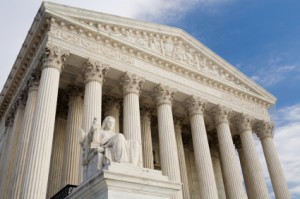By Ross Parker
ticklethewire.com
Supreme Court Justices have a busy November with, among their other duties, six days of Oral Argument, including five cases of interest to criminal justice folks on both sides of the aisle.
Death Penalty Jury Selection: No Court calendar would be complete without a contentious death penalty case. Foster v. Chatman involves the issue of whether Georgia courts bungled in failing to recognize and remedy a racially discriminatory jury selection.
In Batson v. Kentucky (1986) the Supreme Court held that equal protection is denied to an African American defendant if members of his race are purposefully excluded from the jury. That includes the prosecution’s use of peremptory challenges. Once the defendant makes a prima facie (on the first appearance) case of discrimination, the prosecution must prove that the challenges had a neutral, non-racial basis.
In this case the defendant, an 18 year old African American man with an IQ measured to be between 58 and 80, was charged with killing an elderly white woman. The prosecution challenged all four of the black prospective jurors but presented numerous neutral explanations for having done so.
In the habeas corpus proceeding decades after the defendant’s conviction and sentence to death, the defendant obtained the prosecutor’s jury selection notes. These marked the names of the black jurors with a “B,” highlighted their names, and ranked them against each other in case “it comes down to having to pick one of the black jurors.” The notes were contradictory as to neutral bases for challenges and listed all of the black jurors as ”Definite NOs,” along with a single white juror.
The Georgia courts during direct appeal and habeas proceedings blithely rejected the defendant’s arguments and accepted the prosecutor’s assertions, despite the clear plan evidenced in the notes.
Prediction—reversal by a 7-2 vote. Affirming this conviction would confirm the opinion of many that Batson challenges are meaningless as long as the trial prosecutor has disingenuously prepared neutral explanations which have been found acceptable in previous cases and as long as trial judges lack the courage to challenge the prosecutor’s veracity in the face of such questionable circumstances. The case does a disservice to all of the honest prosecutors who seek a fair and impartial jury regardless of race.
Substitute Assets in Forfeiture Actions — Luis v. United States pits the government’s statutory authority to use substitute assets to satisfy a forfeiture conviction against a criminal defendant’s right to use non-criminal but forfeitable assets to retain counsel of choice.
The defendants were charged in a massive Medicare kickback scheme in south Florida. At a pretrial hearing the government presented probable cause that the defendant had so dissipated his assets on luxury purchases that a preliminary injunction restraining even non-traceable assets was justified since their seizure, on conviction, would be necessary as substitute assets to satisfy a forfeiture verdict. The defendant argued that those non-criminal assets were needed to pay the attorney chosen to defend him in the case. The trial court restrained the assets.
In the Kaley case last term the Court upheld the restraint of criminally tainted assets, the only ones sought for forfeiture in the case, but did not rule on the restraint of legitimate assets. In the oral argument in the case there was some ambiguous indication that the Solicitor General arguing the case for the government, along with three of the Justices, assumed that such an injunction would pose constitutional problems. The context of the discussion, however, may well have been limited to cases in which only criminally traceable assets were sought for forfeiture.
In weighing the policy issues of the case, the question is whether a defendant should be able to use forfeitable (but legitimate) assets to pay his attorney even though the interests of forfeiture will be defeated by doing so. If so, there will be little disincentive to keep wealthy defendants from hiding and spending criminal proceeds to avoid government seizure. Defendants will essentially be authorized to use forfeitable assets to pay legal fees.
Prediction—Affirmed 6-3 in favor of the government’s injunction restraining forfeitable assets.
Prisoner Litigation Fees: In Bruce v. Sanders the Court will resolve a split in the Circuits on an interpretation of the Prison Litigation Reform Act. The purpose of that statute was to stem the flood of frivolous prisoner cases by requiring them to pay filing fees if they are able to do so. If they cannot pay the fee at the filing, the statute provides a formula for assessing installments from the prisoner’s trust account, with two limitations. No “exaction” from the account is permissible if it has a balance of $10 or less, and if the prisoner has no balance the filing is still permitted without assessment of cost.
The statute provides an exaction formula of 20% of the prisoner’s monthly income toward the payment of the filing fees, to be forwarded by the prison to the court where the case is filed. The provision, however, fails to make clear how this process is to be administered when the prisoner files multiple cases—does he have to pay 20% for each case (5 Circuits say “yes”) or is the 20% capped regardless of the number of cases (3 Circuits) ?
In the per-case interpretation, when a prisoner has 5 or more cases pending, the warden will exact his entire monthly income (minus the $10 minimum balance) until all fees are satisfied. In the per-defendant interpretation the warden will continue to exact the account until all fees are satisfied. For some prisoners, such as the plaintiff in this case who has over 100 cases filed, this process can consume the entire period of the sentence.
The Circuit split revolves around the construction of the statutory language. The subsection which precedes the formula requirement appears to be reasonably clear as referring to a per-defendant approach, but the subsection in question is ambiguous.
The case has attracted attention on both sides of the issue. Amici curiae briefs have been filed by the Southern Poverty Law Center, as well as by 20 states. Regardless of the result, the resolution will be welcome news for the Bureau of Prisons, which presently has to figure out the diverging views of the Circuits in administering the program.
Prediction—5-4 in favor of the per-case interpretation, meaning that prisoners who file multiple cases will pay the price in having less to spend on sundries.
Sexual Exploitation of Children Statutory Sentence Enhancement: The case of Lockhart v. United States involves yet another split in the Circuits over statutory interpretation. The issue involves the mandatory minimum enhancement for possession of child pornography convictions. This enhancement is triggered by a prior conviction under state law relating to “aggravated sexual abuse, sexual abuse, or abusive sexual conduct involving a minor or ward.”
The disagreement is whether the latter phrase “involving a minor or ward” applies to all three of the categories of predicate offenses or just the third one involving abusive sexual conduct. If it applies only to the last category, prior sexual abuse convictions involving adults would qualify, thus enhancing the sentences of a broader scope of defendants.
The defendant is one of those affected since his prior conviction was the attempted rape of his 53 year old girlfriend. He pled guilty to possessing child pornography but argued that his sentence should not be bumped up to the 10 year mandatory minimum since the enhancement statute requires that all three categories of predicate offenses involve minors.
The trial court rejected this interpretation, following 4 circuits which have ruled that the phrase “involving minors” modifies only the third category of predicates. Two circuits have held to the contrary, that all predicates must involve minors.
The battle revolves around a contest between the “last antecedent rule” (modifying only the phrase it immediately follows) versus the “series qualifier rule” (modifying all of the terms in a series). The statutory history and context seem to support the former, broader approach.
Prediction—Affirm the broader interpretation of predicate offenses as applying to all categories of prior sex abuse convictions, by a slim majority.
Immigration Act Predicate Offenses: The issue in Torres v. Lynch involves yet another Circuit split over the statutory interpretation of a state predicate offense, this one in the context of what constitutes an aggravated felony under the Immigration and Nationality Act (INA). Such a prior conviction subjects the alien to removal from the country without the benefit of eligibility for “cancellation,” i.e., discretionary relief from removal.
One of the categories of aggravated felonies includes those “described in” certain federal statutes, such as in this case, arson. The petitioner’s argument is that state arson convictions do not qualify since they do not, as federal arson convictions, include an element of affecting interstate commerce. The 3rd Circuit has adopted this position; 4 others have included analogous state offenses as predicate aggravated felonies without the interstate commerce requirement.
Prediction—Affirm following the majority of Circuits which have found logic and legislative history to support giving the Bureau of Immigration Affairs some deference in interpreting the statute to support the purpose of facilitating removal of aliens with prior aggravated felonies.
So be prepared for a lot of arcane statutory construction arguments, bread and butter for lawyers, but one of the reasons good fathers urge their children to do something socially useful like bull-riding or being a PR consultant for venal pharmaceutical companies, rather than going to law school.






